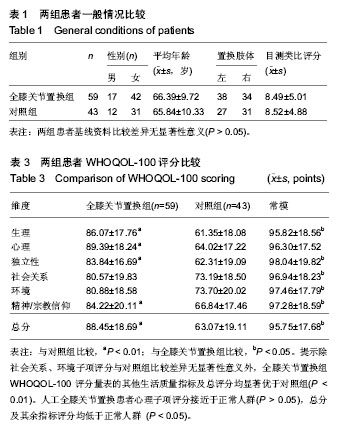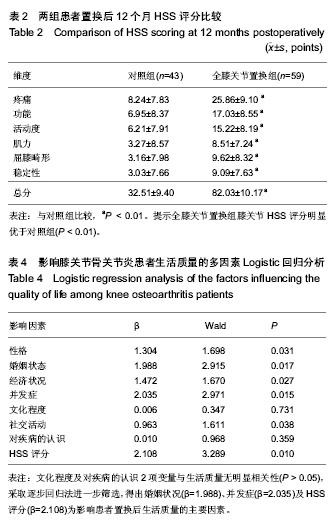| [1] Felson DT, Lawrence RC, Dieppe PA, et al. Osteoarthritis: new insights. Part 1: the disease and its risk factors. Ann Intern Med. 2000;133: 635-646.
[2] Khadem Haghighian M, Alipoor B, Eftekhar Sadat B,et al. Effects of sesame seed supplementation on lipid profile and oxidative stress biomarkers in patients with knee osteoarthritis. Health Promot Perspect. 2014;4(1):90-97.
[3] Murray CJ, Lopez AD. Alternative projections of mortality and disability by cause 1990-2020: Global Burden of Disease Study. Lancet. 1997;349(9064):1498-1504.
[4] Peláez-Ballestas I, Sanin LH, Moreno-Montoya J, et al. Epidemiology of the rheumatic diseases in Mexico. A study of 5 regions based on the COPCORD methodology. J Rheumatol Suppl. 2011;86:3-8.
[5] Davatchi F, Jamshidi AR, Banihashemi AT, et al. WHO-ILAR COPCORD Study (Stage 1, Urban Study) in Iran. J Rheumatol. 2008; 35:1384.
[6] Livshits G, Zhai G, Hart DJ, et al. Interleukin-6 is a sig-nificant predictor of radiographic knee os-teoarthritis: The Chingford study. Arthritis Rheum. 2009;60:2037-2045.
[7] Bhattacharya I, Saxena R, Gupta V. Efficacy of vitamin E in knee osteoarthritis manage-ment of North Indian geriatric population. Ther Adv Musculoskelet Dis. 2012;4:11-19.
[8] Niu J, Nevitt M, McCulloch C, et al. Comparing the functional impact of knee replacements in two cohorts. BMC Musculoskelet Disord. 2014;15:145.
[9] Kim S. Changes in surgical loads and economic burden of hip and knee replacements in the US: 1997-2004. Arthritis Rheum. 2008;59(4):481-488.
[10] Stranges E, Russo A, Friedman B. Procedures with the most rapidly increasing hospital costs, 2004-2007. AHRQ - Healthcare Cost and Utilization Project. Rockville: AHRQ - Healthcare Cost and Utilization Project, 2009:1-9.
[11] Losina E, Thornhill TS, Rome BN, et al. The dramatic increase in total knee replacement utilization rates in the United States cannot be fully explained by growth in population size and the obesity epidemic. J Bone Joint Surg Am. 2012;94(3):201-207.
[12] Devendra S, Robert K. Body Weight, Waist-to-Hip Ratio,Breasts, and Hips:role in judgments of female attractiveness and desirability for relationships. J Pers Soc Psychol. 1995;16:483-507.
[13] Davis EM, Lynd LD, Grubisic M, et al. Responsiveness of health state utility values in knee osteoarthritis. J Rheumatol. 2013;40(12):2075-2082.
[14] Vennu V, Bindawas SM. Relationship between falls, knee osteoarthritis, and health-related quality of life: data from the Osteoarthritis Initiative study.Clin Interv Aging. 2014;9: 793-800.
[15] Tae B, Pelaggi ER, Moreira JG, et al. Impact of bariatric surgery on depression and anxiety symptons, bulimic behaviors and quality of life. Rev Col Bras Cir. 2014;41(3):155-160.
[16] FarrIi J, Miller LE, Block JE. Quality of life in patients with knee osteoarthritis: a commentary on nonsurgical and surgical treatments. Open Orthop J. 2013;7:619-623.
[17] Franic DM, Bothe AK. Psychometric evaluation of condition-specific instruments used to assess health-related quality of life, attitudes, and related constructs in stuttering. Am J Speech Lang Pathol. 2008;17(1):60-80.
[18] Insall JN, Ranawat CS, Aglietti P, et al. A comparison of four models of total knee-replacement prostheses. J Bone Joint Surg Am. 1976;58(6):754-765.
[19] The WHOQOL Group. The World Health Organization Quality of Life Assessment(WHOQOL):development and general psychometric properties. Soc Sci Med. 1998;46:1569-1585.
[20] Jordan KM, Arden NK, Doherty M, et al. EULAR Recommendations 2003: an evidence based approach to the management of knee osteoarthritis:Report of a Task Force of the Standing Committee for International Clinical Studies Including Therapeutic Trials(ESCISIT). Ann Rheum Dis. 2003; 62:1145-1155.
[21] Arnold CM, Gyurcsik NC. Risk factors for falls in older adults with lower extremity arthritis: a conceptual framework of current knowledge and future directions. Physiother Can. 2012; 64(3):302-314.
[22] Prieto-Alhambra D, Nogues X, Javaid MK, et al. An increased rate of falling leads to a rise in fracture risk in postmenopausal women with self-reported osteoarthritis: a prospective multinational cohort study (GLOW). Ann Rheum Dis. 2013; 72(6):911-917.
[23] Vennu V, Bindawas SM. Relationship between falls, knee osteoarthritis, and health-related quality of life: data from the Osteoarthritis Initiative study. Clin Int Aging. 2014;9:793-800.
[24] Marcum ZA, Zhan HL, Perera S. Correlates of gait speed in advanced knee osteoarthritis. Pain Med. 2014;15(8): 1334-1342.
[25] Utrillas-Compaired A, De la Torre-Escuredo BJ, Tebar-Martínez AJ, et al. Does preoperative psychologic distress influence pain, function, and quality of life after TKA? Clin Orthop Relat Res. 2014;472(8):2457-2465.
[26] Bennell KL, Hunt MA, Wrigley TV, et al. Role of muscle in the genesis and management of knee osteoarthritis. Rheum Dis Clin North Am.2008;34: 731-754.
[27] Al-Johani AH, Kachanathu SJ, Ramadan Hafez A, et al. Comparative study of hamstring and quadriceps strengthening treatments in the management of knee osteoarthritis. J Phys Ther Sci. 2014;26(6):817-820.
[28] Hurley MV, Scott DL, Rees J, et al. Sensorimotor changes and functional performance in patients with knee osteoarthritis. Ann Rheum Dis. 1997;56: 641-648.
[29] Zhang M, Driban JB, Price LL, et al. Development of a rapid knee cartilage damage quantification method using magnetic resonance images. BMC Musculoskelet Disord. 2014;15(1): 264.
[30] Peat G, McCarney R, Croft P. Knee pain and osteoarthritis in older adults: a review of community burden and current use of primary health care. Ann Rheum Dis. 2001;60:91-97.
[31] Debette C, Lustig S, Servien E, et al. Total knee arthroplasty of the stiff knee: three hundred and four cases. Int Orthop. 2014;38(2):285-289.
[32] Clifford AG, Gabriel SM, O'Connell M, et al. The KineSpring(®) Knee Implant System: an implantable joint-unloading prosthesis for treatment of medial knee osteoarthritis. Med Devices (Auckl). 2013;6:69-76.
[33] Rasanen P, Paavolainen P, Sintonen H, et al. Effectiveness of hip or knee replacement surgery in terms of quality-adjusted life years and costs. Acta Orthop, 2007;78(2):108-115.
[34] Corona PS, Hernandez A, Reverte-Vinaixa MM, et al. Outcome after knee arthrodesis for failed septic total knee replacement using a monolateral external fixator. J Orthop Surg (Hong Kong). 2013;21(3):275-280.
[35] Keurentjes JC, Fiocco M, So-Osman C, et al. Hip and knee replacement patients prefer pen-and-paper questionnaires: Implications for future patient-reported outcome measure studies. Bone Joint Res. 2013;2(11):238-244.
[36] Murray DW, MacLennan GS, Breeman S, et al. A randomised controlled trial of the clinical effectiveness and cost-effectiveness of different knee prostheses: the Knee Arthroplasty Trial (KAT). Health Technol Assess. 2014;18(19): 1-235.
[37] B?czyk G, Chuchracki M, Opala T. Effect of selected socio-demographic, clinical and biochemical factors on self-reported quality of life among post-menopausal women with osteoporosis. Ann Agric Environ Med. 2013;20(4): 843-848.
[38] Unalan D, Soyuer F, Ozturk A. Comparison of SF-36 and WHOQOL-100 life quality scales in early period tuberculosis subjects. J Pak Med Assoc. 2012;62(11):1161-1167.
[39] Rupp S, Wydra G. Rehabilitation following total knee replacement. Conservative orthopedics and sport science. Orthopade. 2012;41(2):126-135.
[40] Goddard NJ, Mann HA, Lee CA. Total knee replacement in patients with end-stage haemophilic arthropathy: 25-year results. J Bone Joint Surg Br. 2010;92(8):1085-1089.
[41] Muenzberg M, Stretz C, Baur W, et al. Gender influence on the outcome of an unisex total knee arthroplasty system. Technol Health Care. 2014;22(1):129-136. |

